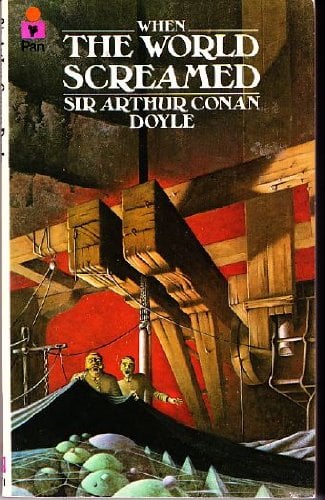When the World Screamed (1)
By:
September 15, 2015

Arthur Conan Doyle’s novella When the World Screamed was first published in 1928. The fifth and final Professor Challenger adventure, it takes us not outward (e.g., to a South American plateau crawling with dinosaurs), nor inward (e.g., to an airtight chamber, while the Earth passes through a poison belt), but instead downward. Challenger, here described as “a primitive cave-man in a lounge suit,” while also “the greatest brain in Europe,” proposes to drill his way from a tract of land in Sussex (England) eight miles beneath the planet’s epidermis. Why? In order to prove his hypothesis that the world is itself a living organism! Enjoy.
I had a vague recollection of having heard my friend Edward Malone, of the Gazette, speak of Professor Challenger, with whom he had been associated in some remarkable adventures. I am so busy, however, with my own profession, and my firm has been so overtaxed with orders, that I know little of what is going on in the world outside my own special interests. My general recollection was that Challenger has been depicted as a wild genius of a violent and intolerant disposition. I was greatly surprised to receive a business communication from him which was in the following terms:
14 (Bis),
Enmore Gardens,
Kensington.Sir,—
I have occasion to engage the services of an expert in Artesian borings. I will not conceal from you that my opinion of experts is not a high one, and that I have usually found that a man who, like myself, has a well-equipped brain can take a sounder and broader view than the man who professes a special knowledge (which, alas, is so often a mereprofession), and is therefore limited in his outlook. None the less, Iam disposed to give you a trial. Looking down the list of Artesian authorities, a certain oddity — I had almost written absurdity — in
your name attracted my attention, and I found upon inquiry that my young friend, Mr. Edward Malone, was actually acquainted with you. I am therefore writing to say that I should be glad to have an interview with you, and that if you satisfy my requirements, and my standard is no mean one, I may be inclined to put a most important matter into your hands. I can say no more at present as the matter is of extreme secrecy, which can only be discussed by word of mouth. I beg, therefore, that you will at once cancel any engagement which you may happen to have, and that you will call upon me at the above address at 10.30 in the morning of next Friday. There is a scraper as well as a mat, and Mrs. Challenger is most particular.I remain, Sir, as I began,
George Edward Challenger.
I handed this letter to my chief clerk to answer, and he informed the Professor that Mr. Peerless Jones would be glad to keep the appointment as arranged. It was a perfectly civil business note, but it began with the phrase: ‘Your letter (undated) has been received.’
This drew a second epistle from the Professor:
‘Sir,’ he said and his writing looked like a barbed wire fence —
I observe that you animadvert upon the trifle that my letter was undated. Might I draw your attention to the fact that, as some return for a monstrous taxation, our Government is in the habit of affixing a small circular sign or stamp upon the outside on the envelope which notifies the date of posting? Should this sign be missing or illegible your remedy lies with the proper postal authorities. Meanwhile, I would ask you to confine your observations to matters which concern the business over which I consult you, and to cease to comment upon the form which my own letters may assume.
It was clear to me that I was dealing with a lunatic, so I thought it well before I went any further in the matter to call upon my friend Malone, whom I had known since the old days when we both played Rugger for Richmond. I found him the same jolly Irishman as ever, and much amused at my first brush with Challenger.
‘That’s nothing, my boy,’ said he. ‘You’ll feel as if you had been skinned alive when you have been with him five minutes. He beats the world for offensiveness.’
‘But why should the world put up with it?’
‘They don’t. If you collected all the libel actions and all the rows and all the police-court assaults —’
‘Assaults!’
‘Bless you, he would think nothing of throwing you downstairs if you have a disagreement. He is a primitive cave-man in a lounge suit. I can see him with a club in one hand and a jagged bit of flint in the other. Some people are born out of their proper century, but he is born out of his millennium. He belongs to the early neolithic or thereabouts.’

‘And he a professor!’
‘There is the wonder of it! It’s the greatest brain in Europe, with a driving force behind it that can turn all his dreams into facts. They do all they can to hold him back for his colleagues hate him like poison, but a lot of trawlers might as well try to hold back the Berengaria. He simply ignores them and steams on his way.’
‘Well,’ said I, ‘one thing is clear. I don’t want to have anything to do with him. I’ll cancel that appointment.’
‘Not a bit of it. You will keep it to the minute — and mind that it is to the minute or you will hear of it.’
‘Why should I?’
‘Well, I’ll tell you. First of all, don’t take too seriously what I have said about old Challenger. Everyone who gets close to him learns to love him. There is no real harm in the old bear. Why, I remember how he carried an Indian baby with the smallpox on his back for a hundred miles from the back country down to the Madeira river. He is big every way. He won’t hurt if you get right with him.’
‘I won’t give him the chance.’
‘You will be a fool if you don’t. Have you ever heard of the Hengist Down Mystery — the shaft-sinking on the South Coast?’
‘Some secret coal-mining exploration, I understand.’
Malone winked.
‘Well, you can put it down as that if you like. You see, I am in the old man’s confidence, and I can’t say anything until he gives the word. But I may tell you this, for it has been in the Press. A man, Betterton, who made his money in rubber, left his whole estate to Challenger some years ago, with the provision that it should be used in the interests of science. It proved to be an enormous sum — several millions. Challenger then bought a property at Hengist Down, in Sussex. It was worthless land on the north edge of the chalk country, and he got a large tract of it, which he wired off. There was a deep gully in the middle of it. Here he began to make an excavation. He announced’ — here Malone winked again — ‘that there was petroleum in England and that he meant to prove it. He built a little model village with a colony of well-paid workers who are all sworn to keep their mouths shut. The gully is wired off as well as the estate, and the place is guarded by bloodhounds. Several pressmen have nearly lost their lives, to say nothing of the seats of their trousers, from these creatures. It’s a big operation, and Sir Thomas Morden’s firm has it in hand, but they also are sworn to secrecy. Clearly the time has come when Artesian help is needed. Now, would you not be foolish to refuse such a job as that, with all the interest and experience and a big fat cheque at the end of it — to say nothing of rubbing shoulders with the most wonderful man you have ever met or are ever likely to meet?’
RADIUM AGE SCIENCE FICTION: “Radium Age” is HILOBROW’s name for the 1904–33 era, which saw the discovery of radioactivity, the revelation that matter itself is constantly in movement — a fitting metaphor for the first decades of the 20th century, during which old scientific, religious, political, and social certainties were shattered. This era also saw the publication of genre-shattering writing by Edgar Rice Burroughs, Sax Rohmer, E.E. “Doc” Smith, Jack London, Arthur Conan Doyle, Aldous Huxley, Olaf Stapledon, Karel Čapek, H.P. Lovecraft, Charlotte Perkins Gilman, Yevgeny Zamyatin, Philip Gordon Wylie, and other pioneers of post-Verne/Wells, pre-Golden Age “science fiction.” More info here.
READ GORGEOUS PAPERBACKS: HiLoBooks has reissued the following 10 obscure but amazing Radium Age science fiction novels in beautiful print editions: Jack London’s The Scarlet Plague, Rudyard Kipling’s With the Night Mail (and “As Easy as A.B.C.”), Arthur Conan Doyle’s The Poison Belt, H. Rider Haggard’s When the World Shook, Edward Shanks’ The People of the Ruins, William Hope Hodgson’s The Night Land, J.D. Beresford’s Goslings, E.V. Odle’s The Clockwork Man, Cicely Hamilton’s Theodore Savage, and Muriel Jaeger’s The Man with Six Senses. For more information, visit the HiLoBooks homepage.
SERIALIZED BY HILOBOOKS: Jack London’s The Scarlet Plague | Rudyard Kipling’s With the Night Mail (and “As Easy as A.B.C.”) | Arthur Conan Doyle’s The Poison Belt | H. Rider Haggard’s When the World Shook | Edward Shanks’ The People of the Ruins | William Hope Hodgson’s The Night Land | J.D. Beresford’s Goslings | E.V. Odle’s The Clockwork Man | Cicely Hamilton’s Theodore Savage | Muriel Jaeger’s The Man With Six Senses | Jack London’s “The Red One” | Philip Francis Nowlan’s Armageddon 2419 A.D. | Homer Eon Flint’s The Devolutionist | W.E.B. DuBois’s “The Comet” | Edgar Rice Burroughs’s The Moon Men | Charlotte Perkins Gilman’s Herland | Sax Rohmer’s “The Zayat Kiss” | Eimar O’Duffy’s King Goshawk and the Birds | Frances Hodgson Burnett’s The Lost Prince | Morley Roberts’s The Fugitives | Helen MacInnes’s The Unconquerable | Geoffrey Household’s Watcher in the Shadows | William Haggard’s The High Wire | Hammond Innes’s Air Bridge | James Branch Cabell’s Jurgen | John Buchan’s “No Man’s Land” | John Russell’s “The Fourth Man” | E.M. Forster’s “The Machine Stops” | John Buchan’s Huntingtower | Arthur Conan Doyle’s When the World Screamed | Victor Bridges’ A Rogue By Compulsion | Jack London’s The Iron Heel | H. De Vere Stacpoole’s The Man Who Lost Himself | P.G. Wodehouse’s Leave It to Psmith | Richard Connell’s “The Most Dangerous Game” | Houdini and Lovecraft’s “Imprisoned with the Pharaohs” | Arthur Conan Doyle’s “The Sussex Vampire”.
